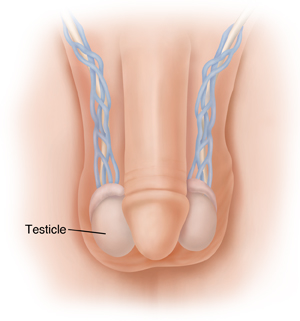Radical Orchiectomy
Radical orchiectomy is surgery to remove a testicle. It’s most often done to treat testicular cancer. Or, it may be needed if a testicle is severely damaged due to infection or injury. The penis is not affected by the surgery. The scrotum (sac of skin that holds the testicles) remains intact after surgery. This sheet tells you more about the surgery and what to expect.

Changes in Your Body
Having a testicle removed can affect how you feel about your body. It may help to talk with a therapist before or after the procedure. In some cases, an artificial testicle (prosthesis) can be placed at a later time. You and your doctor can discuss whether this is an option for you. Having a testicle removed could affect your fertility. If you want to have children, you may choose to store sperm before the procedure as a precaution. Talk to your doctor about this.
Preparing for Surgery
Prepare for the surgery as you have been told. In addition:
-
Tell your doctor about all medications you take. This includes herbs and other supplements. It also includes any blood thinners, such as Coumadin, Plavix, or daily aspirin. You may need to stop taking some or all of them before surgery.
-
Do not eat or drink during the 8 hours before your surgery. This includes coffee, water, gum, and mints. (If you have been instructed to take medications, take them with a small sip of water.
The Day of Surgery
The surgery takes about 1 hour(s). You may go home the same day or spend one or more nights in the hospital.
Before the surgery begins:
-
An IV line is put into a vein in your arm or hand. This line delivers fluids and medications (such as antibiotics).
-
To keep you free of pain during the surgery, you’re given general anesthesia. This medication puts you into a state like deep sleep through the surgery. A tube may be inserted into your throat to help you breathe.
During the surgery:
-
An incision is made in the groin.
-
The testicle is removed. In cases of testicular cancer, the spermatic cord may also be removed. This structure contains nerves, arteries, and a tube that carries sperm away from the testicle.
-
When the surgery is complete, the incision is closed with stitches (sutures) or staples. These may need to be removed by the doctor at a follow-up visit.
After the Surgery
You will be taken to a room to wake up from the anesthesia. You may feel sleepy and nauseated. If a breathing tube was used, your throat may be sore at first. You may also be given a jockstrap to wear. This helps relieve pain and swelling, and prevents injury. Once you are ready to go home, have an adult family member or friend drive you.
Recovering at Home
Follow the instructions you have been given to care for yourself. During your recovery:
-
Take prescribed pain medications as directed.
-
Care for your incision as instructed. Check the incision daily for signs of infection (listed below).
-
Follow your doctor’s guidelines for showering. Avoid swimming, bathing, using a hot tub, and other activities that cause the incision to be covered with water until your doctor says it’s okay.
-
Wear a jock strap or snug underwear as directed.
-
Avoid heavy lifting and strenuous exercise as directed.
-
Do not have sex for 4 weeks.
-
Do not drive until you are no longer taking pain medication and your doctor says it’s okay.
Call the Doctor If You Have Any of the Following:
-
Chest pain or trouble breathing (call 911 or another emergency service)
-
Fever of 101.5°F (38.6°C) or higher
-
Symptoms of infection at the incision site such as increased redness or swelling, warmth, worsening pain, or foul-smelling drainage
-
Increased pain or swelling in the scrotum or groin area
-
Pain that is not relieved by pain medications
Follow-Up
You will have follow-up visits so your doctor can check on your healing. Stitches or staples may need to be removed. You and your doctor can also discuss any further treatments you may need.
Risks and Possible Complications Include
-
Bleeding (may require a blood transfusion)
-
Infection
-
Damage to nearby nerves, blood vessels, soft tissues, and organs
-
Infertility
-
Changes in hormone levels
-
Recurrence of cancer or failure to keep cancer from spreading
-
Risks of anesthesia (the anesthesiologist will discuss these with you)
© 2000-2025 The StayWell Company, LLC. All rights reserved. This information is not intended as a substitute for professional medical care. Always follow your healthcare professional's instructions.